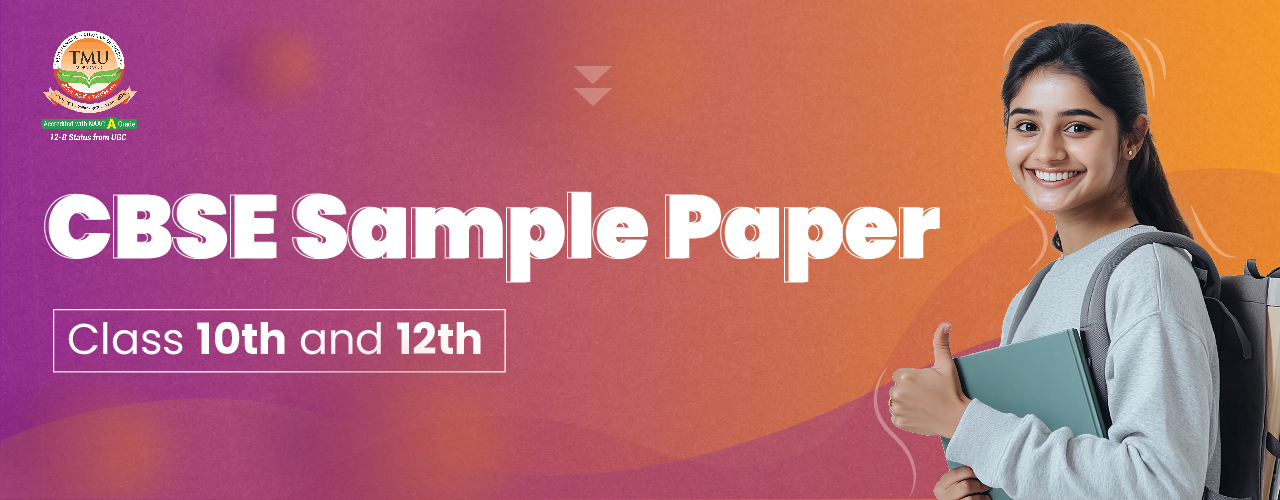CBSE Sample Paper for Class 10th and 12th
Table of Contents
A CBSE sample paper is a mock test paper designed to help students prepare for the Central Board of Secondary Education (CBSE) board examinations. These sample papers are created to closely resemble the actual exam format, including the types of questions, difficulty level, and marking scheme.
By practising with these papers, students can:
- Understand the exam pattern: Familiarize themselves with the structure, question types, and time allotted for each section.
- Identify important topics: Recognize the areas that are frequently tested in the exams.
- Improve time management: Practice answering questions within the given time frame.
- Boost confidence: Gain familiarity with the exam environment and reduce exam anxiety.
- Identify areas of weakness: Recognize the topics they need to focus on more.
CBSE sample papers are valuable resources for students preparing for their board exams as they provide a realistic assessment of their preparedness and help them refine their exam strategies.
What are Sample Papers?
Here are some popular educational boards and their sample papers:
1. Central Board of Secondary Education (CBSE)
- CBSE Sample Papers: These papers are designed by the CBSE board itself and closely follow the official syllabus and exam pattern. They are available for various subjects and classes on the official CBSE website.
2. Council for the Indian School Certificate Examinations (CISCE)
- CISCE Sample Papers: These papers are created by the CISCE board for the ICSE and ISC examinations. They are available on the official CISCE website and various educational platforms.
3. State Boards
- State Board Sample Papers: Many state boards in India also release sample papers for their respective board exams. These papers are available on the official websites of the state boards or through educational institutions.
4. International Baccalaureate (IB)
- IB Sample Papers: The IB organization provides sample papers for its various programs, including the IB Diploma Programme and the Middle Years Programme. These papers are available on the official IB website.
5. Other Boards
- Cambridge Assessment International Education (CAIE): This board provides sample papers for its IGCSE, AS, and A Level examinations.
- Excel: This UK-based board also offers sample papers for its various qualifications.
Teerthanker Mahaveer University
Apply for Admission
Click Here To Apply for Admission
CBSE Sample Papers for Class 10th
CBSE Sample Papers for Class 10th are mock tests designed to help students prepare for the Central Board of Secondary Education (CBSE) board examinations. These papers are created to closely resemble the actual exam format, including the types of questions, difficulty level, and marking scheme.
Key Benefits of Using CBSE Sample Papers for Class 10th:
- Understanding the Exam Pattern: Familiarize yourself with the structure, question types, and time allotted for each section.
- Identifying Important Topics: Recognize the areas that are frequently tested in the exams.
- Improving Time Management: Practice answering questions within the given time frame.
- Boosting Confidence: Gain familiarity with the exam environment and reduce exam anxiety.
- Identifying Areas of Weakness: Recognize the topics you need to focus on more.
Where to Find CBSE Sample Papers for Class 10th:
- Official CBSE Website: The CBSE board releases official sample papers on its website (cbseacademic.nic.in). You can find them under the "Sample Question Papers" section.
- Educational Websites and Platforms: Many educational websites and platforms offer CBSE sample papers for Class 10th.
CBSE Sample Papers for Class 12th
CBSE Sample Papers for Class 12th are mock tests designed to help students prepare for the Central Board of Secondary Education (CBSE) board examinations. These papers are created to closely resemble the actual exam format, including the types of questions, difficulty level, and marking scheme.
Where to Find CBSE Sample Papers for Class 12th:
- Official CBSE Website: The CBSE board releases official sample papers on its website (cbseacademic.nic.in). You can find them under the "Sample Question Papers" section.
- Educational Websites and Platforms: Many educational websites and platforms offer CBSE sample papers for Class 12th.
CBSE Sample Papers Download Link
You can download the latest CBSE sample papers for the 2024-2025 academic session directly from the Download Links given below:
Class 10 CBSE Sample Papers
| Subject | Download Link |
| Mathematics Standard | Download |
| Mathematics Basic | Download |
| Science | Download |
| Social Science | Download |
| English Language & Literature | Download |
| Hindi A | Download |
| Hindi B | Download |
Class 12 CBSE Sample Papers
| Subject | Download Link |
| Mathematics | Download |
| Physics | Download |
| Chemistry | Download |
| Biology | Download |
| English Core | Download |
| Economics | Download |
| Accountancy | Download |
| Business Studies | Download |
| History | Download |
| Political Science | Download |
These links lead to PDF files of the sample papers from the official CBSE Academic website.
New pattern CBSE sample papers
CBSE's revised sample paper pattern for 2024-2025 reflects its focus on competency-based assessment, aligned with the goals of the National Education Policy (NEP) 2020. Here's a detailed analysis based on the latest updates:
Key Features of the New CBSE Sample Paper Pattern (2024-2025):
1. Competency-Based Questions
- Weightage: Approximately 50% of the paper consists of competency-based questions.
- Formats: Case-based questions, source-based questions, and assertion-reasoning questions.
- Purpose: Tests students' ability to apply knowledge in real-life contexts and problem-solving skills.
2. Objective Section
- Weightage: Around 20% of the paper comprises multiple-choice questions (MCQs), true/false, and other objective formats.
- Focus Areas: Quick thinking, recall, and understanding basic concepts.
3. Constructed Response Questions
- Weightage: 30% of the paper is allocated to short and long-answer questions.
- Types: Includes analytical, descriptive, and explanation-based questions.
4. Incorporation of Internal Choices
- Proportion: About 33% of the questions provide internal choices.
- Benefit: Helps reduce stress and allows flexibility in question selection.
5. Real-Life Application Questions
- Examples: Case studies, interdisciplinary problem-solving, and real-world scenario-based problems.
- Aim: To integrate learning with practical applications.
6. Subject-Specific Adjustments
- Science and Maths: Focus on numerical and application-based questions.
- Languages: Emphasis on comprehension, creative writing, and grammar.
- Humanities: Source-based questions and analysis of current scenarios.
- Commerce: Case studies related to business scenarios, interpretation of graphs, and data analysis.
Additional Insights:
- Sample Papers Availability: CBSE releases sample papers annually to help students and educators understand the exam format. These are available on the CBSE's official website.
- Practise Strategy: Students should attempt these sample papers under exam conditions to gauge their preparedness.
CBSE Board Paper Marking Scheme
The CBSE Board Paper Marking Scheme provides detailed guidelines on how marks are distributed for each question in the board exams. It is designed to ensure transparency and consistency in the evaluation process. Here's a breakdown of the marking scheme for the 2024-2025 academic session:
General Features of the CBSE Board Marking Scheme
- Section-Wise Division:
- Section A: MCQs, Fill in the Blanks, and True/False (1 mark each).
- Section B: Short Answer Questions (3–4 marks).
- Section C: Long Answer Questions (5–6 marks).
- Internal Choice:
- Approximately 33% of questions offer internal choice to students for flexibility.
- Step-Wise Marking:
- For numerical and problem-solving questions, partial marks are awarded for correct steps, even if the final answer is incorrect.
- Ensures that students are credited for their approach.
- Language and Presentation:
- Answers are marked for content, coherence, and adherence to the word limit.
- Grammatical errors in non-language subjects are usually not penalized unless they hinder understanding.
Grading System
- CBSE uses a 9-point grading system for Classes 10 and 12. Grades are awarded based on the percentage range:
- A1: Top 1/8th of passed candidates.
- A2: Next 1/8th.
- And so on.
CBSE Exam Pattern 2025
The Central Board of Secondary Education (CBSE) has implemented significant changes to the exam pattern for the 2024-2025 academic session, with a continued emphasis on competency-based assessment. Here's an overview of the updated structure:
1. Competency-Based Questions:
- Class 10: Approximately 50% of the questions are competency-based, and designed to assess students' ability to apply knowledge in real-life scenarios.
- Class 12: The proportion of competency-based questions has increased from 40% to 50%, reflecting a stronger focus on practical application and critical thinking.
2. Multiple Choice Questions (MCQs):
- MCQs constitute 20% of the total marks across both Class 10 and Class 12 exams, aiming to enhance critical thinking and quick decision-making skills among students.
3. Constructed Response Questions:
- The weightage for traditional short and long-answer questions has been reduced from 40% to 30% to make space for competency-based questions.
4. Internal Choices:
- Approximately 33% of the questions offer internal choices, providing students with flexibility in attempting questions.
5. Subject-Specific Changes:
- Science and Mathematics: An increased emphasis on application-based questions to assess analytical skills.
- Languages: Focus on comprehension, creative writing, and grammar.
- Humanities: Source-based questions and analysis of current scenarios.
- Commerce: Case studies related to business scenarios, interpretation of graphs, and data analysis.
6. Syllabus Reduction:
- The syllabus for Classes 10 and 12 has been reduced by 15% for the 2025 academic session, allowing students to focus on core concepts.
7. Exam Format:
- The exams will continue to be conducted in the offline mode, with each exam lasting 3 hours.
8. Minimum Passing Criteria:
- Students must secure a minimum of 33% in each subject and overall to qualify for the CBSE board exams.
9. Exam Commencement:
- The CBSE board exams for 2025 are scheduled to commence on February 15, 2025.
These changes aim to shift the focus from rote learning to a more analytical and application-based evaluation, preparing students for real-world challenges.
CBSE Class 12th Syllabus
The Central Board of Secondary Education (CBSE) has released the syllabus for Class 12 for the academic year 2024-25. This comprehensive curriculum encompasses a wide range of subjects across various streams, including Science, Commerce, and Humanities.
Here’s an overview of the CBSE Class 12th Syllabus for the 2024-2025 academic session in a table format:
| Subject | Key Topics |
| Languages | - English Core: Reading comprehension, writing skills, literature (prose, poetry, drama) |
| - Hindi Core: Comprehension, writing skills, literature (prose, poetry, drama) | |
| Mathematics | - Calculus, Vectors, 3D Geometry, Probability, Relations and Functions |
| - Differential Equations, Integrals, Linear Programming | |
| Physics | - Mechanics, Gravitation, Thermodynamics, Waves and Oscillations, Electrostatics, Current Electricity |
| - Electromagnetic Induction, Optics, Dual Nature of Matter | |
| Chemistry | - Organic Chemistry, Inorganic Chemistry, Physical Chemistry |
| - Chemical Kinetics, Surface Chemistry, Electrochemistry, Coordination Compounds | |
| Biology | - Genetics, Ecology, Human Physiology, Biotechnology, Evolution, Reproduction |
| Economics | - Microeconomics, Macroeconomics, Indian Economic Development, Globalization, Money and Banking |
| Accountancy | - Accounting for Partnerships, Companies, and Financial Statements |
| Business Studies | - Principles of Management, Business Environment, Marketing, Financial Management, Consumer Protection |
| Computer Science | - Programming, Python, Object-Oriented Programming, Database Management |
| Informatics Practices | - Data Handling, Database Management, Networking, Cyber Safety |
| Physical Education | - Sports Physiology, Nutrition, Fitness, Yoga, Health Education, Sports Management, Test and Measurement in Sports |
| Psychology | - Human Development, Psychological Disorders, Therapeutic Approaches, Social Influence, Attitude, and Group Dynamics |
| Sociology | - Social Structure, Stratification, Social Change, Indian Society, Gender Studies, Political Sociology |
| History | - Ancient, Medieval, and Modern Indian History, World History |
| Geography | - Resources, Geographical Features, Cartography, Physical Geography, Human Geography, Urbanization, Environment, and Development |
| Art & Design | - Various forms of painting, sculpture, visual arts |
| Music | - Indian Classical Music, Western Music |
| Elective Subjects | - Includes subjects like Home Science, Political Science, Fine Arts, and additional language options |
It's advisable to consult the official CBSE website or trusted educational resources to access the most accurate and up-to-date information regarding the Class 12 syllabus.
CBSE Previous Year Question Papers
Here are some resources where you can find CBSE Previous Year Question Papers:
- Official CBSE Website:
- Visit the official CBSE website: CBSE Academics
- Navigate to the "Board Examination" section.
- Look for the "Previous Years Question Papers" link.
- Select the desired class (10th or 12th) and subject.
- Download the question papers in PDF format.
Remember that practising with the previous year's question papers is an excellent way to prepare for your CBSE exams. It helps you understand the exam pattern, identify important topics, and improve your time management skills.
Conclusion
By utilizing CBSE sample papers and familiarizing yourself with the CBSE exam format, marking scheme, and syllabus, you can significantly enhance your preparedness for the board examinations. These resources provide valuable insights into the question types, weightage of different topics, and assessment strategies employed by the CBSE board. Practising with sample papers under timed conditions simulates the exam environment and hones your time management skills.
Frequently Asked Questions (FAQs)
Q1: What is the new CBSE update for 2024-25?
Ans: The CBSE has implemented significant updates for the 2024-25 academic year, prioritizing competency-based learning. Key changes include a substantial increase in competency-based questions to 50















